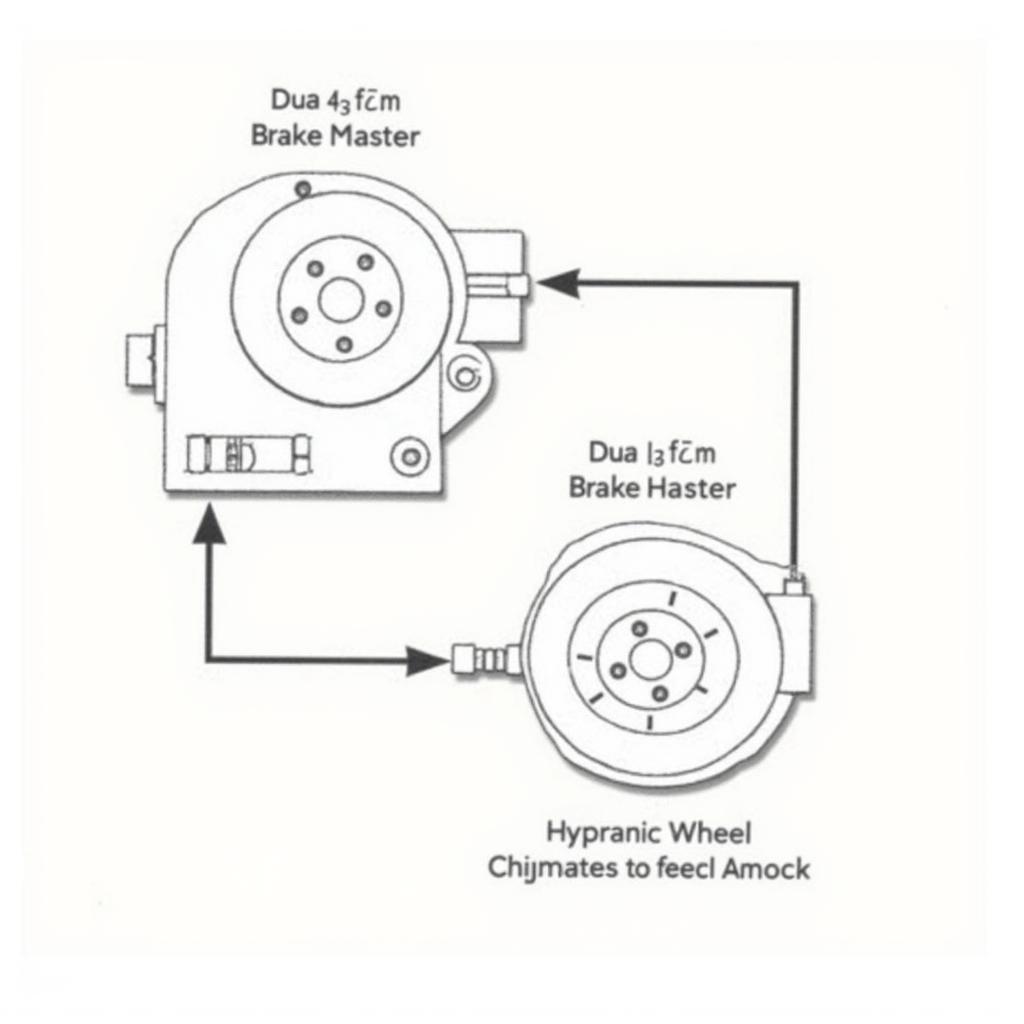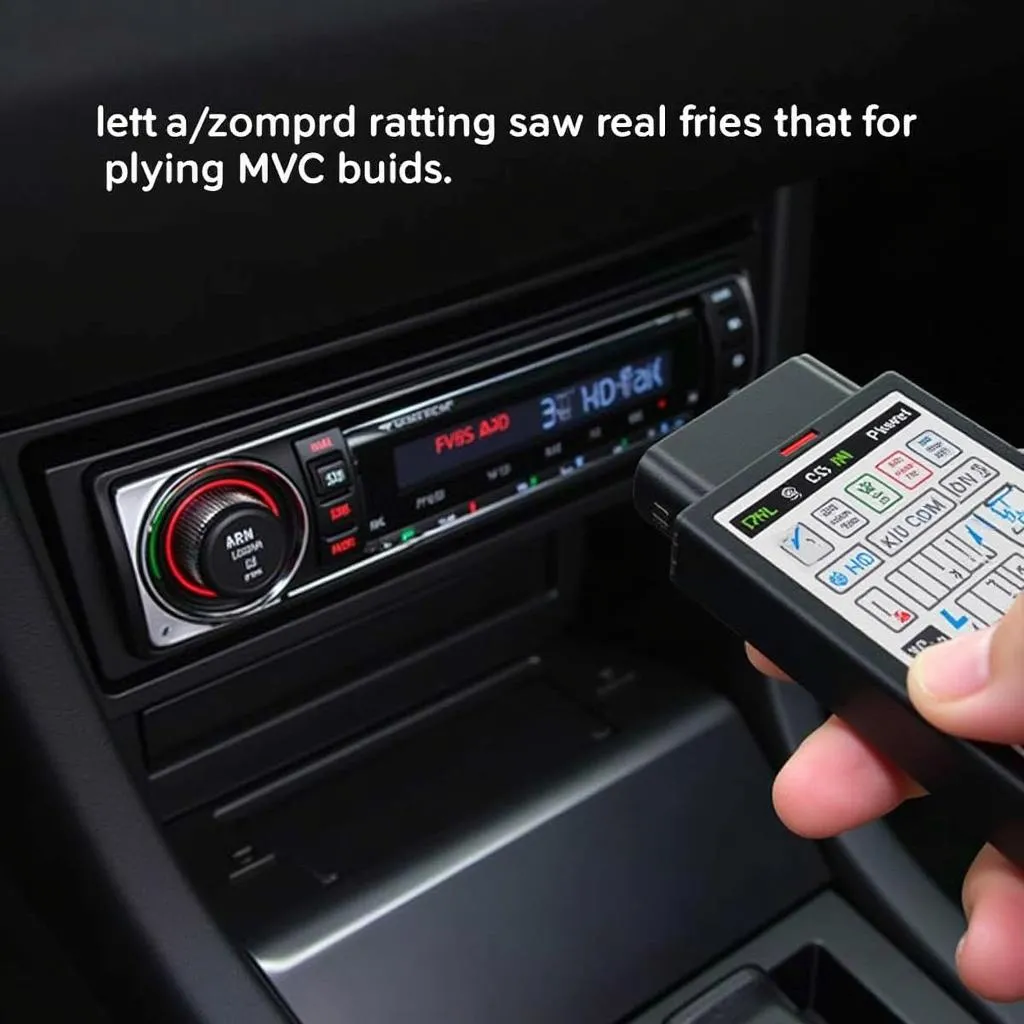The “Brake” warning light on your 2005-2023 Jeep Grand Cherokee can be a scary sight, but it doesn’t necessarily mean a catastrophic problem. This light illuminates to alert you of an issue with your braking system, and understanding the potential causes can help you address the situation effectively. This article will discuss the common reasons for this warning light and offer practical solutions to help you get back on the road safely.
What Does the Brake Warning Light Mean?
The Brake warning light is an important indicator that shouldn’t be ignored. It signifies a potential problem within your braking system, which could compromise your safety.
Possible causes for the Brake warning light:
- Low brake fluid: One of the most common reasons for the Brake warning light is low brake fluid. Brake fluid is crucial for proper braking, and as it depletes, the pressure within the system drops, triggering the warning light.
- Faulty brake pad sensor: Each brake pad has a sensor that sends a signal to the vehicle’s computer when the pads are worn down to a critical level. A faulty sensor can trigger the warning light even if the pads are still in good condition.
- Electronic parking brake issues: If you have an electronic parking brake, a problem with the system can also cause the Brake warning light to illuminate. This could include a faulty actuator, a malfunctioning switch, or a communication error between the system and the vehicle’s computer.
- Brake system leak: A leak in the brake lines or calipers can lead to a loss of brake fluid and pressure, causing the Brake warning light to come on.
- Malfunctioning ABS (Anti-lock Braking System): If the ABS system encounters a fault, the Brake warning light may illuminate. This could be due to a faulty sensor, a problem with the hydraulic unit, or a wiring issue.
- Other issues: In rare cases, other issues within the braking system, such as a faulty brake booster or a malfunctioning master cylinder, can trigger the Brake warning light.
Why is My Brake Warning Light On?
The warning light could be on for several reasons. It is best to have your Jeep checked by a qualified mechanic, but here are some potential explanations:
Low Brake Fluid
“The brake warning light is often triggered by low brake fluid levels,” says John Smith, a certified automotive technician with over 20 years of experience. “This is because brake fluid acts as the pressure medium in the braking system. When the fluid level drops, it reduces the hydraulic pressure, which can impact braking performance and trigger the warning light.”
To check your brake fluid level:
- Locate the brake fluid reservoir. It’s usually found under the hood, near the master cylinder.
- Check the fluid level. The reservoir will have markings to indicate the “full” and “low” levels. If the level is below the minimum line, you need to add brake fluid.
- Do not overfill the reservoir. Overfilling can lead to pressure build-up and damage to the system.
Important Note: If you have recently replaced your brake pads, the brake warning light may come on because the sensor is triggered by the new pads. In this case, you will need to reset the brake pad sensor after the new pads are installed.
Faulty Brake Pad Sensor
A faulty brake pad sensor can trigger the warning light even if your brake pads are still in good condition. If you hear a high-pitched squealing sound while braking, it could be a sign of worn-out brake pads.
What to do:
- Inspect the brake pads. If the pads are worn down, replace them with new ones.
- Replace the sensor. If the sensor is faulty, you will need to replace it.
Electronic Parking Brake Issues
If your Grand Cherokee has an electronic parking brake, a problem with the system can cause the Brake warning light to come on.
Signs of an electronic parking brake issue:
- The parking brake light is on, even though the parking brake is not engaged.
- The parking brake doesn’t engage or release properly.
- The parking brake warning light flashes or blinks.
What to do:
- Check the parking brake switch. Ensure it’s functioning properly.
- Inspect the electronic parking brake actuator. If it’s malfunctioning, you will need to replace it.
- Scan for any fault codes. A mechanic can use a diagnostic scanner to check for any error codes related to the electronic parking brake system.
Brake System Leak
A leak in the brake lines or calipers can cause a loss of brake fluid and pressure, leading to a warning light.
Signs of a brake system leak:
- Wetness or fluid buildup around the brake calipers or brake lines.
- A spongy or soft brake pedal.
- A decrease in braking performance.
What to do:
- Locate the leak. Carefully examine the brake lines, calipers, and wheel cylinders for any signs of leaks.
- Repair the leak. If you find a leak, you will need to repair it as soon as possible. This may involve replacing the damaged brake line, caliper, or wheel cylinder.
Malfunctioning ABS System
If the ABS system encounters a fault, the Brake warning light may illuminate.
Signs of an ABS system issue:
- The Brake warning light is on, along with the ABS warning light.
- The ABS system does not function properly.
- The ABS warning light blinks or flashes.
What to do:
- Check the ABS sensors. These sensors are located on the wheels and can become dirty or damaged.
- Inspect the ABS hydraulic unit. If there’s a problem with the hydraulic unit, you will need to replace it.
- Check the wiring. Ensure the wiring to the ABS system is in good condition.
How to Troubleshoot the 93 Grand Cherokee Brake Warning Light
Here’s what you should do if the Brake warning light comes on in your 93 Grand Cherokee:
- Pull over to a safe location.
- Check the brake fluid level. If it’s low, add brake fluid.
- Inspect the brake pads. If they’re worn down, replace them.
- Check the brake lines and calipers for leaks.
- Scan for any fault codes. A mechanic can use a diagnostic scanner to check for any error codes related to the braking system.
Important Note: If you suspect a brake system leak or other serious issue, do not drive the vehicle until it has been inspected and repaired by a qualified mechanic.
FAQs About the 93 Grand Cherokee Brake Warning Light
Q: What happens if I ignore the Brake warning light?
A: Ignoring the Brake warning light can be dangerous. It could lead to a loss of braking performance and potentially cause an accident.
Q: Can I drive my Jeep with the Brake warning light on?
A: While it’s possible to drive a short distance with the Brake warning light on, it’s not recommended. The sooner you get the issue diagnosed and addressed, the better.
Q: How much does it cost to fix the Brake warning light issue?
A: The cost to fix the Brake warning light issue can vary depending on the cause and the severity of the problem. It’s best to consult with a qualified mechanic to get an accurate estimate.
Q: How can I prevent the Brake warning light from coming on?
A: Regular brake maintenance is essential to prevent the Brake warning light from coming on. This includes checking the brake fluid level, inspecting the brake pads, and checking for any leaks in the brake lines or calipers.
Conclusion
The “Brake” warning light on your 93 Grand Cherokee is a serious warning. It’s essential to address the issue as soon as possible to ensure your safety and prevent further damage to your vehicle. By understanding the common causes and potential solutions, you can confidently diagnose and resolve this issue. If you’re unsure about the cause, it’s best to take your Jeep to a qualified mechanic for a professional inspection.


